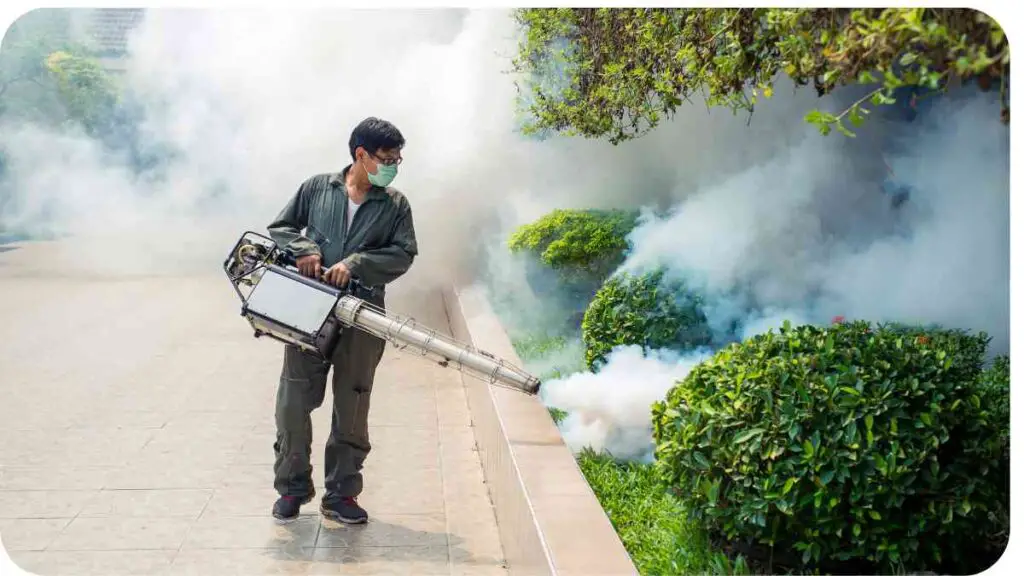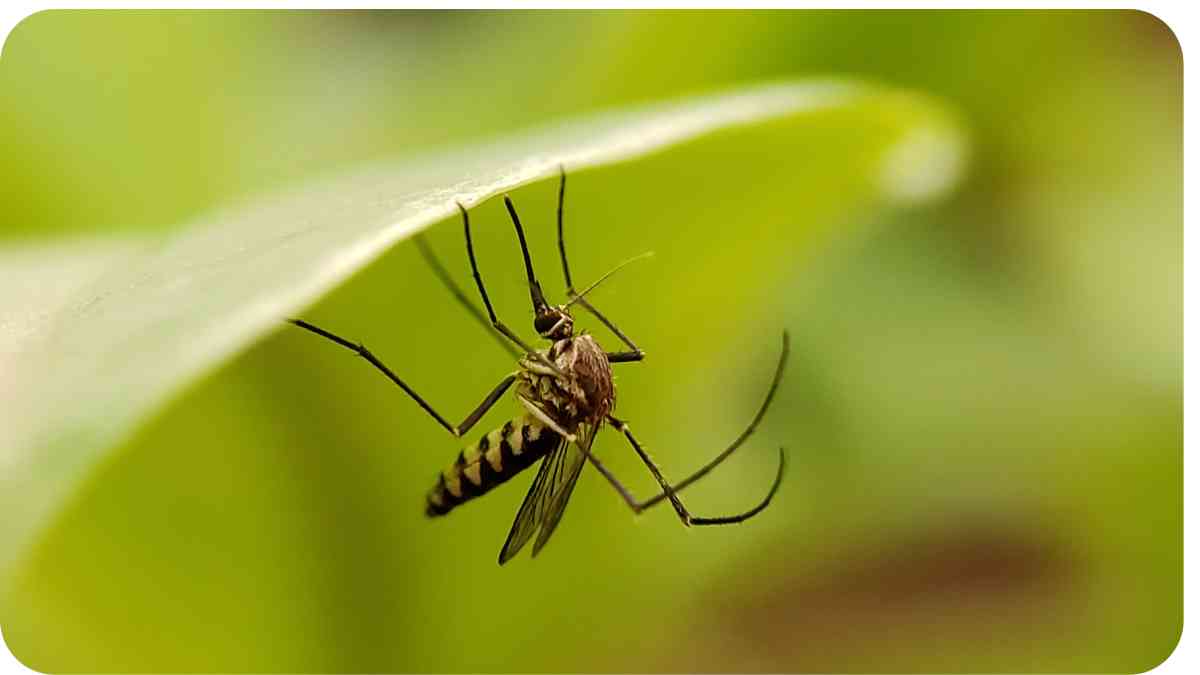Ah, mosquitoes. These tiny, buzzing creatures can turn a lovely summer evening in your front yard into a nightmare. If you’re tired of slapping away these pests and dealing with itchy bites, you’re not alone.
Many homeowners face the same challenge and ask, “How do I get rid of mosquitoes in my front yard?” Luckily, there are several effective strategies you can employ to reclaim your outdoor space from these unwelcome visitors. In this article, we’ll explore various methods, from natural repellents to community efforts, that will help you enjoy your front yard mosquito-free.
| Takeaways |
|---|
| Understanding mosquito behavior is crucial for effective control. |
| Mosquitoes thrive in stagnant water; eliminate breeding sites. |
| Natural repellents like certain plants and essential oils can help. |
| Physical barriers and traps provide immediate relief. |
| Chemical solutions offer more control but should be used wisely. |
| Proper lawn maintenance discourages mosquito habitation. |
| Creating mosquito-free zones enhances outdoor living spaces. |
| Community efforts amplify individual mosquito control measures. |
| Promptly treating mosquito bites can prevent discomfort and infection. |
| Long-term strategies like Integrated Pest Management are effective. |
| Understanding the costs of different methods aids in decision-making. |
Understanding Mosquito Behavior

Before diving into the methods of mosquito control, it’s essential to understand their behavior. Knowing their lifecycle and preferred habitats can help you target your efforts more effectively.
Eliminating mosquitoes from your front yard can be a challenge. Learn how to deal with mosquitoes with these tips and tricks.
Life Cycle of Mosquitoes
Mosquitoes go through four life stages: egg, larva, pupa, and adult. This process can take as little as a week or as long as a month, depending on the species and environmental conditions.
| Life Stage | Description | Duration |
|---|---|---|
| Egg | Laid in or near water | 1-2 days |
| Larva | Aquatic, feeding on organic matter | 4-14 days |
| Pupa | Aquatic, transitional stage | 1-4 days |
| Adult | Emerges from pupa, capable of flying and reproducing | Up to several weeks |
Common Habitats
Mosquitoes thrive in areas with stagnant water, as it provides the perfect breeding ground for their larvae. Common habitats include:
- Ponds and marshes
- Clogged gutters
- Birdbaths
- Old tires
- Any containers that hold water
Assessing Your Front Yard
To effectively reduce the mosquito population, start by assessing your front yard for potential breeding sites and areas where mosquitoes are most active.
Keep your front yard mosquito-free with these natural and chemical methods to get rid of mosquitoes.
Identifying Breeding Grounds
Walk around your yard and look for any standing water. Pay particular attention to:
- Flowerpots
- Pet water bowls
- Birdbaths
- Clogged gutters
- Low-lying areas in your lawn
Monitoring Mosquito Activity
Keep track of when and where mosquitoes are most active in your yard. Are they more prevalent in the morning or evening? Are they concentrated in certain areas? This information will help you target your control measures.
Prevent and eliminate mosquitoes from your front yard with these expert tips for controlling mosquitoes.
Natural Mosquito Repellents
Using natural repellents can be an effective and eco-friendly way to keep mosquitoes at bay. Here are some options:
Plants that Repel Mosquitoes
Certain plants naturally repel mosquitoes due to their scent. Consider planting the following in your yard:
| Plant | Scented Component | Additional Benefits |
|---|---|---|
| Citronella | Citronella oil | Decorative grass |
| Lavender | Linalool | Attracts pollinators |
| Marigold | Pyrethrum | Deters other pests |
| Basil | Estragole | Culinary uses |
| Catnip | Nepetalactone | Cats love it |
Essential Oils
Essential oils can be used in diffusers or applied to the skin (when diluted) to repel mosquitoes. Popular options include:
- Lemon eucalyptus oil
- Lavender oil
- Tea tree oil
- Peppermint oil
Physical Barriers and Traps
Physical barriers and traps can provide immediate relief from mosquitoes in your front yard.
Say goodbye to mosquitoes in your front yard with these expert-recommended tips for keeping mosquitoes at bay.
Mosquito Nets
Use mosquito nets to cover seating areas or porches. These nets can be draped over furniture or installed as permanent fixtures around outdoor living spaces.
Mosquito Traps
Various types of mosquito traps can help reduce the mosquito population. These traps attract mosquitoes using heat, carbon dioxide, or light, and then trap or kill them.
| Trap Type | How It Works | Effectiveness |
|---|---|---|
| CO2 Traps | Emit carbon dioxide to attract mosquitoes | High |
| UV Light Traps | Use UV light to lure mosquitoes | Moderate |
| Heat Traps | Generate heat to mimic body temperature | Moderate to High |
| Sticky Traps | Use adhesive surfaces to trap mosquitoes | Variable |
Chemical Solutions
When natural methods are not enough, chemical solutions can offer more control over the mosquito population.
Insecticides
Insecticides can be applied to vegetation and other surfaces to kill mosquitoes on contact. Common types include:
- Pyrethroids
- Organophosphates
- Neonicotinoids
Fogging
Fogging involves dispersing insecticides in a fine mist, covering large areas quickly. This method is particularly effective for immediate relief, but may require repeated applications.
Water Management
Managing water in your yard is crucial to preventing mosquitoes from breeding.
Draining Standing Water
Regularly check empty containers that collect water. Ensure your gutters are clear and that any low spots in your yard are properly graded to prevent water from pooling.
Get rid of mosquitoes in your front yard with this comprehensive guide to eliminating mosquitoes from your yard.
Water Treatments
Consider using larvicides in standing water that cannot be drained. These treatments target mosquito larvae, preventing them from developing into adults.
| Larvicide Type | Application Method | Duration of Effectiveness |
|---|---|---|
| Biological (e.g., BTI) | Tablets or granules | Several weeks |
| Chemical (e.g., Methoprene) | Liquid or granules | Several weeks |
Maintaining Your Lawn

A well-maintained lawn can discourage mosquitoes from settling in your yard.
Regular Mowing
Keep your grass trimmed short, as tall grass provides a cool, damp environment where mosquitoes can hide.
Proper Irrigation
Avoid overwatering your lawn, as excess moisture can create ideal conditions for mosquitoes. Ensure your irrigation system is properly adjusted.
Creating Mosquito-Free Zones
Designate specific areas in your yard where you can relax without being bothered by mosquitoes.
Outdoor Living Areas
Set up outdoor living spaces with mosquito deterrents like fans, which create air movement that mosquitoes find difficult to navigate.
Screened Porches
If possible, install screened porches or gazebos where you can enjoy the outdoors without being exposed to mosquitoes.
Community Efforts
Mosquito control is more effective when done on a larger scale. Consider engaging with your community.
Neighborhood Initiatives
Collaborate with neighbors to identify and eliminate breeding sites. Community clean-up days can be very effective.
Public Health Campaigns
Participate in local public health campaigns that aim to reduce mosquito populations. These campaigns often provide valuable resources and support.
Dealing with Mosquito Bites
Even with the best prevention methods, bites can still happen. Here’s how to deal with them.
First Aid for Bites
Apply ice to reduce swelling and use anti-itch creams to alleviate discomfort. Avoid scratching to prevent infection.
Preventing Future Bites
Wear long sleeves and pants when outdoors during peak mosquito activity times. Use repellents on exposed skin.
Personal Experiences
Sharing personal stories can provide additional insights and encouragement.
My Journey with Mosquito Control
As someone who enjoys gardening, I’ve had my fair share of mosquito battles. Implementing a combination of natural repellents and water management has significantly reduced the mosquito population in my yard.
Expert Advice
Consulting with pest control professionals and following their advice on effective mosquito control methods has also been invaluable.
Long-term Mosquito Control Strategies
For lasting results, consider integrating long-term strategies into your mosquito control efforts.
Integrated Pest Management
Integrated Pest Management (IPM) combines biological, cultural, mechanical, and chemical tools to control mosquito populations in a sustainable way.
Biological Control
Introduce natural predators, like dragonflies or mosquito fish, to your yard to help keep the mosquito population in check.
Cost Analysis of Mosquito Control Methods

Understanding the costs associated with different control methods can help you make informed decisions.
Upfront Costs
| Method | Estimated Cost |
|---|---|
| Planting Repellent Plants | $20 – $50 per plant |
| Installing Mosquito Nets | $50 – $200 |
| Purchasing Traps | $30 – $300 |
| Applying Insecticides | $20 – $100 |
Maintenance Costs
| Method | Estimated Annual Cost |
|---|---|
| Plant Maintenance | $10 – $30 per plant |
| Replacing Traps | $50 – $150 |
| Regular Fogging | $100 – $300 |
Conclusion
By understanding mosquito behavior and employing a combination of natural and chemical methods, you can significantly reduce the mosquito population in your front yard. Regular maintenance and community efforts are also key to keeping these pests at bay. With these strategies, you can enjoy your outdoor space without the constant annoyance of mosquitoes.
Further Reading
For more detailed information on how to get rid of mosquitoes in your yard, check out these helpful resources:
- How to Get Rid of Mosquitoes in Your Yard – Lawn Love provides a comprehensive guide on mosquito control, including natural and chemical methods.
- How to Get Rid of Mosquitoes in Your Lawn and Landscape – The Lawn Care Nut offers practical tips and solutions to keep your lawn and landscape mosquito-free.
- How to Get Rid of Mosquitoes in Your Backyard – Senske’s blog discusses various strategies for reducing mosquito populations in your backyard, focusing on both prevention and treatment.
FAQs
How can I naturally repel mosquitoes in my front yard?
You can naturally repel mosquitoes by planting certain plants like citronella, lavender, and marigolds. Additionally, using essential oils such as lemon eucalyptus or peppermint oil can also be effective.
What are the most effective mosquito traps?
The most effective mosquito traps are CO2 traps, which emit carbon dioxide to attract mosquitoes. Other effective options include UV light traps and heat traps.
How often should I treat standing water with larvicides?
Larvicides should be applied to standing water every few weeks or as directed by the product instructions to prevent mosquito larvae from developing into adults.
Can maintaining my lawn help reduce mosquitoes?
Yes, keeping your grass trimmed and avoiding overwatering can help reduce mosquito habitats. Regular lawn maintenance disrupts the cool, damp environments where mosquitoes thrive.
What are some common breeding grounds for mosquitoes in my yard?
Common breeding grounds for mosquitoes include birdbaths, clogged gutters, flowerpots, pet water bowls, and any containers that collect water. Regularly checking and emptying these items can help reduce mosquito breeding sites.

Hi! My name is Hellen James, and I’m here to help you with your home-maintenance needs. Whether it’s building a better yard or just trying to fix a garden—I can show you how.


